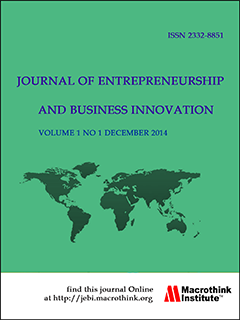Entrepreneurial Orientation, Innovation and Performance of Value-system Actors
DOI:
https://doi.org/10.5296/jebi.v8i2.19227Abstract
The purpose of this study was to explore entrepreneurial orientation as a cognitive construct attributable to individuals and its relationship with innovation and performance from an industry ecosystem perspective. The study adopted a mixed design approach involving exploration of the factors and a diagnosis of their hypothesized relationships. A mixed sampling of members of a leather industry association and the linked industry institutions was carried out with a 76% response rate achieved. Quantitative data was collected from key decision-makers as informants of firms in Kenya’s leather industry using a questionnaire for guided interviews. The Delphi Technique and a pilot study (Cronbach’s Alpha 0.700 – 0.772) were used to establish instrument reliability. Factor analysis was performed on the study variables using Principal Component Analysis before inferential analysis. Entrepreneurial orientation showed validity as a second-order latent construct comprising three cognitive dimensions, namely vision for growth, opportunity recognition and calculated risk-taking. Entrepreneurial orientation and its antecedents were established as determinants of performance of value-system actors in an industry (R2=0.422, F=13.417, p=0.000). It further showed that this relationship is partially mediated by innovation by the firms (Sobel test Z-value = 3.30449610, p=0.00095147). The study recommends extension of this research to other industries.
Downloads
Published
How to Cite
Issue
Section
License
Copyright (c) 2024 Journal of Entrepreneurship and Business Innovation

This work is licensed under a Creative Commons Attribution 4.0 International License.


